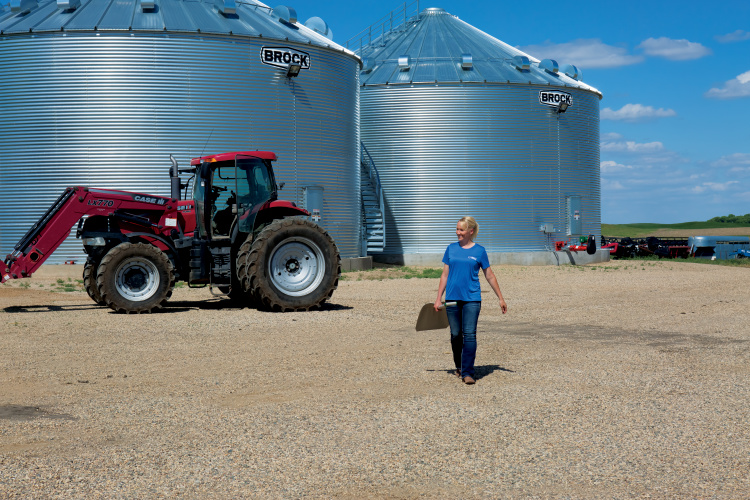Home > North Dakota > North Dakota Ag Education > Ag Degrees Open Doors for North Dakota Graduates
Ag Degrees Open Doors for North Dakota Graduates
In partnership with: North Dakota Department of Agriculture
 Sarah Heinrich was a farm kid. She grew up in Mandan, following her dad around their cattle operation and working on 4-H projects with her mom. Her parents nurtured her interest in agriculture, as did her uncle, Al Gustin, a longtime farm news broadcaster.
Sarah Heinrich was a farm kid. She grew up in Mandan, following her dad around their cattle operation and working on 4-H projects with her mom. Her parents nurtured her interest in agriculture, as did her uncle, Al Gustin, a longtime farm news broadcaster.
Today, Heinrich is the farm and ranch director for KFGO radio and other stations across the state, and an active partner in her own family-farm operation near Medina with her husband, Richie.
Ashley Bruner grew up on a farm in Drake, but her parents weren’t involved in agriculture. Her dad worked construction and her mom was a postal employee. Though she was active in the North Dakota Farmers Union growing up, it was Ashley’s marriage to Travis that furthered her interest in agriculture.
Together, the couple serves as secretary/treasurer for the North Dakota Angus Association and works on the Bruner family Angus ranch, with Ashley responsible for the operation’s catalog and advertising.
Both women have found careers in agriculture, a field that the U.S. Department of Agriculture reports has more jobs available than graduates to fill them.
 Heinrich took a traditional route, growing up on the farm and then majoring in agricultural communications and public relations, and minoring in animal science at North Dakota State University (NDSU). Bruner earned an associate’s degree at Bismarck State College,a bachelor’s in mass communications and business from Jamestown College, and a master’s of business administration from the University of North Dakota.
Heinrich took a traditional route, growing up on the farm and then majoring in agricultural communications and public relations, and minoring in animal science at North Dakota State University (NDSU). Bruner earned an associate’s degree at Bismarck State College,a bachelor’s in mass communications and business from Jamestown College, and a master’s of business administration from the University of North Dakota.
These different paths don’t surprise David Buchanan, associate dean for academic programs at the NDSU College of Agriculture, Food Systems, and Natural Resources.
“There are a variety of employment opportunities in agriculture and a variety of academic paths to get there,” he says. “If you are committed to preparing yourself and if you have some flexibility in terms of where you’re willing to live, there are plenty of opportunities in the field.”
Jobs Galore
What are those opportunities? A recent study by the U.S. Department of Agriculture indicates that there will be an average of nearly 58,000 job openings across the country each year for the next three years for graduates with bachelor’s degrees or higher. Nearly half of those opportunities will be in management and business; a quarter will be in STEM (science, technology, engineering and math) fields, and the rest will be in sustainable food and biomaterials production, as well as education, communications and governmental services.

Each year, nearly 35,000 students will graduate from agriculture programs in the United States. They will fill about 60 percent of the job openings, which leaves plenty of opportunities for graduates in biology, business administration, engineering, education, communications and consumer services.
Jobs include traditional work in farm operations, production, commodity trading, and agricultural loans and finance, plus opportunities in emerging fields like seed genetics, plant science and sustainability. And then there are jobs like Heinrich’s and Bruner’s that support all those efforts via communications and public relations.
Buchanan says over the course of his 40-year agricultural career, the diversity of job opportunities has increased tremendously.
“When I was in college, most people were coming from a ranch or farm to go to school and then returning to the farm after completing their education,” he says. “Now, many agriculture jobs are not on the farm, and increasingly, many students who are getting agriculture degrees haven’t spent time on the farm. With the growing number of jobs in the sector and in our state, we need students from both inside and outside the traditional agricultural community to share their talents, to rigorously prepare themselves, and to take advantage of the many exciting opportunities in the field.”



